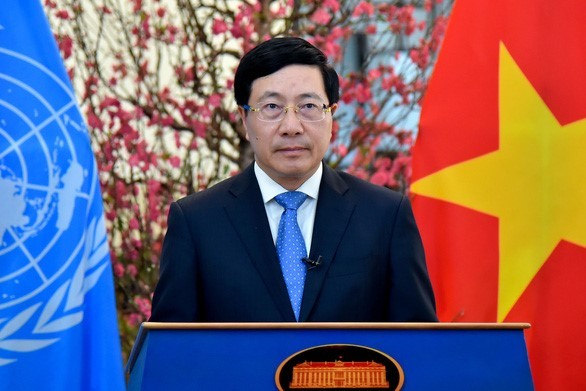(VOVWORLD) - Vietnam will run for the UN Human Rights Council’s 2023-2025 tenure as a candidate of the Association of Southeast Asian Nations (ASEAN), Deputy Prime Minister and Foreign Minister Pham Binh Minh said at the 46th Regular Session of the UNHCR in Geneva, Switzerland. He said the decision reflects Vietnam’s wish to help protect human rights.
 Deputy Prime Minister and Foreign Minister Pham Binh Minh Deputy Prime Minister and Foreign Minister Pham Binh Minh |
Protecting human rights is the duty of every progressive, civilized country. The socialist political regime Vietnam is building is a regime of the people, by the people, and for the people. Since its founding as a socialist democratic country, Vietnam has consistently pursued the goal of promoting, protecting, and ensuring human rights.
Human rights have been protected under the constitution since Vietnam’s founding
In the Declaration of Independence that gave birth to the Democratic Republic of Vietnam on September 2, 1945, President Ho Chi Minh declared: “All people are equal from birth, all people have the right to live, to be happy and free.”
With this Declaration, President Ho Chi Minh affirmed the values of the nation emphasizing that human rights can only be ensured in close association with right to independence and freedom. The national name of Vietnam is consistent with the motto: “Independence – Freedom – Happiness” which means Vietnam’s consistent goal is to persistently pursuing national independence and the people’s right to freedom and happiness.
In the 1946, 1959, 1980, 1992, and 2013 Constitutions, Vietnam has always guaranteed human rights and citizen rights. The 2013 Constitution dedicates a chapter to human rights and the fundamental rights and obligation of citizens.
Right after Article 1 on territorial rights, Article 2 of the 2013 Constitution affirms that the right of supreme sovereignty belongs to the people: “The State of the Socialist Republic of Vietnam is a socialist state ruled by law and of the People, by the People and for the People”. The capitalized word “People” emphasizes the people’s critical role in history and in national construction and defense. In the 2014-2019 period, the Vietnamese State promulgated more than 100 legal documents and ordinances ensuring human rights and citizen rights.
Since its national renewal, Vietnam has improved human rights in politics, economics, culture, and society.
Human rights are ensured in all aspects
Vietnam’s achievements in human rights in the last 75 years have been reflected in the country’s dramatic economic growth during the 35 years of national renewal from 1986 to 2020. From a backward agriculture-based economy with a GDP of only 14 billion USD in 1985, Vietnam’s economy grew to a GDP of 343 billion USD in 2020, ranking among the world’s 40 largest economies and 4th in ASEAN.
Vietnam’s economic growth is the foundation for State policies on social security, culture, and society.
With an HDI value of 0.704, Vietnam ranks 117th among 189 countries and territories but has one of the fastest rates of HDI improvement.
Vietnam has focused on promoting, protecting, and ensuring fundamental rights for the most vulnerable.
Vietnam has adopted 118 policies to reduce poverty, promote socio-economic development, improve people’s lives and ensure social security for ethnic minority people. Thanks to coordinated social policies, the poverty rate in Vietnam fell from 9.88% in 2015 to below 3% in 2020.
Vietnam’s care for the vulnerable has been evident during the COVID-19 pandemic. Vietnam has one of the world’s lowest rates of COVID-19 infection and death, evidence that the Vietnamese Party and State have given high priority to ensuring the safety and health of the people.
As a developing country, Vietnam faces numerous difficulties and challenges, but it has been consistent in its guidelines and policies to promote fundamental human rights and work with other countries to protect the human rights defined in the “Universal Declaration on Human Rights”.